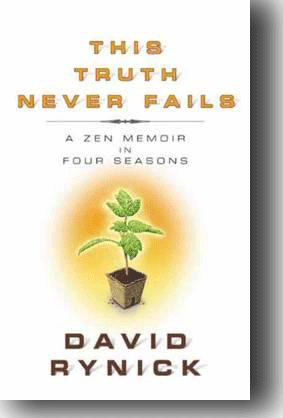
David Rynick, Wisdom Publishing, Boston, 2012, 200 pp
reviewed by Vladimir K
Every situation we encounter contains the truth of our existence; we are never separate from this mysterious aliveness. This truth never fails.
David Rynick is a Zen teacher at the Boundless Way Zen Temple in Worcester, Massachusetts. He received inka, formal recognition as a Zen teacher and Dharma heir, from George Bowman, a disciple of Korean Rinzai master, Seung Sahn. The Boundless Way web site notes that Rynick also studied with the Japanese Rinzai master, Joshu Sasaki. In his new book, This Truth Never Fails, it says that he is also authorized to teach in the Sōtō tradition but neither the Boundless Way web site nor Rynick’s own website make mention of this. Rynick has had a colourful, mixed career, as have many Western Zen teachers. He has been a potter, a dancer, an art teacher and headmaster at a now-defunct high school in Madison, Connecticut. Besides teaching Zen at the Boundless Way Zen Temple, Rynick is a ‘life and leadership’ coach, certified through the International Coaching Federation and the Coaches Training Institute. He is also the president of his Unitarian Universalist church and a Certified Maine Kayak Guide. All in all, a busy c.v.

This Truth Never Fails is a short volume of musings on day-to-day life broken into the four seasons. Although the events told here took place over a number of years, using the four seasons gives continuity to the stories as if they had taken place over one year. The anecdotes are very short, most taking up less than two pages with nothing very special taking place, which is the point of the whole book — which is the point of Zen practice. Charlotte J. Beck wrote a book about it (Nothing Special, HarperOne, 1993) and Shunryu Suzuki devoted a chapter to it in his seminal book, Zen Mind, Beginner’s Mind (Weatherhill, 1970). As Suzuki said, “Before you attain it, it is something wonderful, but after you obtain it, it is nothing special. It is just you yourself, nothing special.” (p 47) Huang-po sent his student, Lin-chi, to Ta-yü, to learn Zen. Ta-yü woke him with a few choice words and the newly enlightened Lin-chi said, “After all, there isn’t much in Huang-po’s Buddhism!” (Chung-Yuan, 1969:117) Nothing special. Zen is our daily life, with all its joys, pains and untidiness. There is birth and there is death and in between there is a bit of messiness and that’s all there is to It. As Rynick says in his Introduction, “What we long for is always present, hiding in plain sight”. (p 5) How many of us have “plain sight”? How many of us can see what’s in front of our nose? When Dōgen returned from China, empty-handed, all he discovered was that his eyes were horizontal and his nose was vertical. Nothing special.
Many people will enjoy this book and find value in its teachings. For my taste, it’s a little too much like a life coach trying to point out the wonders of the world around us. In the back of the book there is a section entitled “Companion Guide” that offers suggestions of practice based on what one has read earlier in the book. As the introduction to the guide states, “This companion guide is intended as a tool to help you use some of the concepts and issues raised in the book as a way to come into deeper relationship with yourself and the world around you.” (p 187) The guide asks you to reflect, practice and remember some teaching the book brought up. I found most of the ‘remember’ sections to be a bit too new age for my liking. For example, pithy guidance such as “Remember: You are not merely who you think you are. You are more than your anxious mind”. (p 189) or “Remember: Our lives can be an expression of our love.” (p 198) may seem rather trite for many Zen students who have practiced for a long time. Having said that, I’m sure that many who read this book may find it helpful in developing their understanding of day-to-day practice. At least, I hope so. While this is not a book for me, it may be for others, and that’s good enough.
References
Beck, Charlotte, J., Smith, Steven (1993), Nothing Special, HarperOne, San Francisco
Chung-Yuan, Chang (1969), Original Teachings of Ch’an Buddhism, Pantheon, New York & Boston
Suzuki, Shunryu (1981), Zen Mind, Beginner’s Mind, Weatherhill, New York & Tokyo
